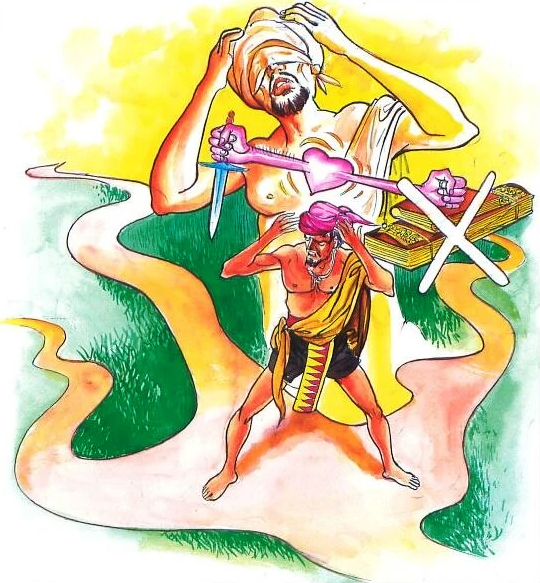Verse 38: If a man’s mind is unsteady, if he is ignorant of the true Dhamma, and if his faith is wavering, then his knowledge will never be perfect.
Verse 39: If a man’s mind is free from passion, if he is free from ill will, if he has abandoned both good and evil, and if he is vigilant, for such a man there is no danger.
The Story of Thera Cittahattha
While residing at the Jetavana monastery, the Buddha uttered Verses (38) and (39) of this book, with reference to Thera Cittahattha.
A man from Savatthi, after looking for his lost ox in the forest, felt very hungry and went to a village monastery, where he was given the remains of the morning meal. While taking his food, it occurred to him that even though he worked hard every day he could not get such good food and that it might be a good idea to become a bhikkhu. So he asked the bhikkhus to admit him into the Order. At the monastery, he performed the duties of a bhikkhu and as there was plenty of food he soon gained weight. After some time, he got weary of going round for alms-food and returned to the life of a lay man. A few days later, he felt that life at home was too strenuous and he went back to the monastery to be admitted as a bhikkhu for a second time. For a second time, he left the Order and returned to home-life. Again, he went back to the monastery for a third time and left it. This shuttling process went on for six times, and because he acted only according to his whims he was known as Thera Cittahattha.
While he was going back and forth between his home and the monastery, his wife became pregnant. One day, during his last stay at home, he happened to enter the bedroom while his wife was asleep. She was almost naked as the clothes she was wearing had partially fallen off. She was also snoring loudly through her nose and mouth and saliva was trickling down her mouth. Thus, with her mouth open and her bloated stomach, she looked just like a corpse. Seeing her thus, he instantly came to perceive the impermanent and unpleasant nature of the body, and he reflected, “I have been a bhikkhu for several times and it is only because of this woman that I have not been able to remain as a bhikkhu.” Hence, taking the yellow robe with him he left his home for the monastery for the seventh time. As he went along he repeated the words “impermanence” and “unpleasantness” (anicca and dukkha) and thus attained Sotapatti Fruition on the way to the monastery.
On arrival at the monastery he asked the bhikkhus to admit him into the Order. They refused and said, “We cannot admit you as a bhikkhu. You have been shaving your head so often that your head is like a whetting stone.” Still, he entreated them to admit him into the Order just once more and they complied. Within a few days, the bhikkhu Cittahattha attained arahatship together with Analytical Insight. Other bhikkhus, seeing him staying on for a long time in the monastery, were surprised and they asked him the reason why. To this, he replied. “I went home when I still had attachment in me, but now that attachment has been cut off” The bhikkhus, not believing him, approached the Buddha and reported the matter. To them, the Buddha said, “Thera Cittahattha was speaking the truth; he shifted between home and monastery before because at that time, his mind was not steadfast and he did not understand the Dhamma. But at this moment, Thera Cittahattha is already an arahat; he has discarded both good and evil.”
Then the Buddha spoke in verse as follows:
Verse 38: If a man’s mind is unsteady, if he is ignorant of the true Dhamma, and if his faith is wavering, then his knowledge will never be perfect.
Verse 39: If a man’s mind is free from passion, if he is free from ill will, if he has abandoned both good and evil, and if he is vigilant, for such a man there is no danger.
Dhammapada Verses 38 and 39
Cittahatthatthera Vatthu
Anavatthitacittassa
saddhammam avijanato
pariplavapasadassa
panna na paripurati.
Anavassutacittassa
ananvahatacetaso
punnapapapahinassa1
natthi jagarato2 bhayam.
Source: Tipitaka








Add a comment